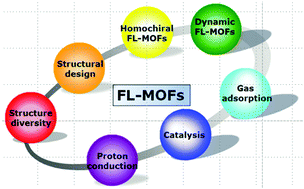Metal–organic frameworks based on flexible ligands (FL-MOFs): structures and applications†
Abstract
Metal–organic frameworks (MOFs), also known as coordination polymers (CPs), are crystalline materials constructed from metal ions or clusters bridged by organic ligands to form one-, two-, or three-dimensional infinite networks. In contrast with the prolific production of MOFs based on rigid ligands (RL-MOFs), the design, syntheses and applications of MOFs based on flexible ligands (FL-MOFs) are somewhat overlooked. Although sacrificing a measure of control, the use of flexible ligands may provide unique opportunities to obtain novel crystalline framework materials exhibiting desirable attributes. In this review, emphasis has been placed on the design and the structural diversity of FL-MOFs. Homochiral FL-MOFs and dynamic frameworks induced by flexible ligands are also briefly outlined. An overview is also shown for the applications of FL-MOFs as platforms for gas adsorption, heterogeneous catalysis, proton conduction etc.

- This article is part of the themed collection: Metal Organic Frameworks (MOFs)

 Please wait while we load your content...
Please wait while we load your content...